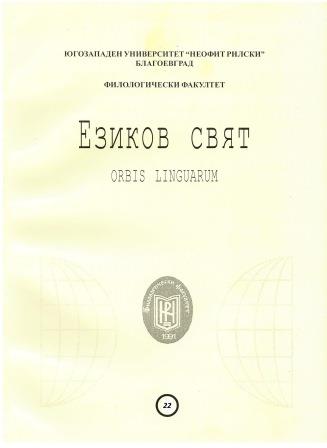АНТРОПОЦЕНТРИЧЕСКИЙ ХАРАКТЕР ФРАЗЕОЛОГИЧЕСКИХ ЭВФЕМИЗМОВ В СЛАВЯНСКИХ ЯЗЫКАХ
ANTHROPOCENTRIC CHARACTER OF PHRASEOLOGICAL EUPHEMISMS IN THE SLAVIC LANGUAGES
Author(s): Olena Voytseva, Natalia DemianenkoSubject(s): Language and Literature Studies, Theoretical Linguistics, Lexis, Semantics, Philology
Published by: ЮГОЗАПАДЕН УНИВЕРСИТЕТ »НЕОФИТ РИЛСКИ«
Keywords: anthropocentric paradigm; taboo; implicit semantics; euphemism; phraseological euphemisms; reclamation; Slavic languages
Summary/Abstract: The article is devoted to the consideration of euphemistic phraseological units used to nominate topics significant for native speakers of Slavic languages such as birth and death, the human body, age, physiology, diseases, and human vices, as well as their dynamics, semantic and functional characteristics. The studied phraseological units related to non-linguistic phenomena are part of an anthropocentric paradigm and represent a public ban on pronouncing certain nominations in a particular language group. The object of this study are verbal and nominal phraseological units in the system of Slavic languages denoting concepts, phenomena and actions replacing words prohibited for extra-linguistic reasons and having a pronounced anthropocentric character. The purpose of the work is a comparative semantic-functional analysis of phraseological euphemisms in Slavic languages. It is emphasized that phraseological euphemisms replace words denoting concepts, phenomena and actions that are considered taboo for the Slavs, whose history dates back to the distant past of the Slavic peoples. They were originally associated with religious faith, fear of the gods, supernatural beings, nature, magical thinking and the deep conviction about the interdependence between the thing and the name. Comparative semantic and functional analysis of euphemistic phraseological units reveals coincident nominations in different Slavic languages and differences in phraseological units containing standards that replace certain words and expressions denoting objects and phenomena that nowadays replace not taboo entities, but linguistic units perceived in the language collective as non-tactful, rude or vulgar.
Journal: Езиков свят - Orbis Linguarum
- Issue Year: 22/2024
- Issue No: 1
- Page Range: 032-045
- Page Count: 14
- Language: Russian

